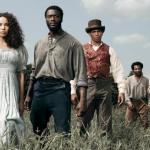'Underground': How a Slave-Revolt Series Made It to Primetime TV
https://portside.org/2016-04-17/underground-how-slave-revolt-series-made-it-primetime-tv

Portside Date:
Author: KENNY HERZOG
Date of source:
Rolling Stone

Early in the premiere of WGN America's slave-revolt drama Underground, a captured runaway named Noah (Aldis Hodge) is shoved into a decrepit shed on a plantation in rural Georgia. The year is 1857; the Civil War is still four long years away. The camera whips around 360 degrees from Noah's point of view, catching glimpses of sick, malnourished black men and women, all of them shivering in makeshift bunks and slumped against unforgiving walls. And though he does not say a word, the sequence immediately establishes Noah as the show's determined protagonist. At the risk of sounding crass given the historical atrocity the show unflinchingly deals with, it feels like the moment when this slave resolves to be something of a superhero.
"We're both comic-book people," the show's co-creator and executive producer Joe Pokaski says, about himself and co-creator/executive producer Misha Green. (Between them, Green and Pokaski have written or produced for Heroes and Daredevil.) And from his perspective, "This is the most heroic, thrilling story ever told in American history."
Pokaski isn't speaking specifically of his lead character's journey so much as the historic Underground Railroad itself. Throughout most of the 19th century up until emancipation, a clandestine network of black Northerners, white abolitionists and former slaves helped thousands of subjugated African-Americans escape to Union states or Canada. Underground, which premieres on March 9th, zeroes in on the getaway plans of Noah and several accomplices toiling on this antebellum plantation: his romantic interest Rosalee (Jurnee Smollett-Bell), the fiery preacher Moses (Mykelti Williamson), the duplicitous black slave driver Cato (Alano Miller) and the resident gentle giant Zeke (Theodus Crane). It's Hodge's character, however, who surveys and assembles a group of allies, with the tactical urgency of Yul Brenner finding six worthy gunslingers to make up his Magnificent Seven. "'Oh wow, this dude's crazy,'" Hodges says when asked about his reaction to the pilot's script. "But he's also cunning, intelligent and kind of brilliant."
Which is not a bad way to describe the series itself. Underground walks a tricky tightrope by setting what's ultimately a swaggering, stylish and surprisingly sexy action-drama against a period in American history that's largely been conceived for television with epic, reverential deference. The very first sounds you hear in the pilot — outside of Noah frantically panting as he tries to elude a gang of bounty hunters — are the militant percussion and elastic bass of Kanye West's "Black Skinhead." The song's audible contrasts mirror the show's choice to amplify a sense of immediacy via modern hip-hop and R&B. "From the start, we said we were going to use contemporary music to bridge the past and the present," Green affirms, adding that the song was written into the earliest script. "It gives it an energy that a lot of people are surprised by, but once they settle into it, it drives the story."
Both Green and Pokaski knew they would need an outside hand to help supervise the soundtrack. Enter John Legend and his Get Lifted production company, who had recently partnered with Legendary Television and have worked on projects ranging from a doc on South Central L.A.'s urban gardens to the story of black French Revolutionary general Thomas Alexandre-Dumas. On Underground, Legend was present during creative meetings and future edits, but mostly focused on making sure the show's music coherently communicated its message while pacing the action.
"We're not telling a story about the occupation, we're telling a story about the revolution."-Executive producer Misha Green
"That's exactly what were trying to do — connect it," Legend says. "This story could have easily felt like it should have been on PBS and on a museum wall, but we wanted it to feel more thrilling than that, and the music helps to bring that energy and connect the audience to the action. The action itself is pretty urgent, but the job of the music is to enhance that." For example, with the Kayne song, "You hear the breathing, you hear the beat, you know it's a contemporary song. But it fits perfectly with what the guy's doing on the screen. From the very beginning, it sets the tone."
Given the number of recently acclaimed feature films that have approached slavery and its aftermath from pioneering new perspectives — be it Quentin Tarantino's controversy-baiting Django Unchained, the Oscar-winning 12 Years a Slave, or the upcoming Nat Turner biopic The Birth of a Nation — it's surprising that television has been slower to adapt narratives from the era. (A new adaptation of Alex Haley's Roots is scheduled to air in May, but it's been almost four decades since the groundbreaking 1977 miniseries first aired.) Green concedes that when she and Pokaski first presented their genre-crossover concept about heroic, runaway plantation workers, they got feedback along the lines of, "It sounds cool, but we can't really see it, cause we've only seen this one way." Her counter was simple: "We're not telling a story about the occupation, we're telling a story about the revolution — and that's something you can come back to week after week."
